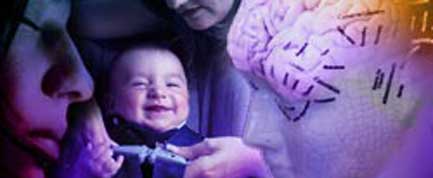Good News About the Blues: Scientists Discover Gene Therapy for Depression

Scientists have discovered a new gene that makes mice happy, a finding that suggests another avenue of drugs for improving depression in humans.
The research represents the first time that depression has been eliminated genetically in any organism, said Guy Debonnel, a psychiatrist and professor at McGill University.
Debonnel and his colleagues achieved this effect by creating and breeding mice lacking a gene also found in humans that affects the transmission of the mood-modulating chemical serotinin.
Mice without the gene, called TREK-1, acted as if they had been treated with anti-depressants for at least three weeks, he said. By removing TREK-1 in mice, the animals performed as if they weren't depressed when confronted with five standard behavioral tests scientists use for depression in mice.
If future scientists follow up on this research and find a compound which can effectively shut down the same gene in humans, then the same mood lift could be induced.
"This would be completely different, in terms of pharmaceutical approach, from everything else that is done today for the treatment of depression," Dubonnel told LiveScience.
A separate study earlier this year by Eric Nestler of the University of Texas Southwestern Medical Center and his colleagues identified a different gene, called BDNF, as involved in depression, and found that removing it in mice made them tolerant of bullying and resistant to withdrawing socially from the rest of the mice.
Sign up for the Live Science daily newsletter now
Get the world’s most fascinating discoveries delivered straight to your inbox.
Debonnel said that social withdrawal or defeat is not considered to stand in for depression by researchers in this field. Rather, social defeat is just a form of fear. Also, the earlier research tested just one behavioral expression. Debonnel's research focused on five classic, behavioral models of depression.
How depression works
Major depression affects about 13 percent of all Americans during their lifetime, according to Columbia University's Deborah Hasin, who was part of a team of scientists that analyzed one of the largest surveys ever conducted on psychiatric disorders and their relationship to alcohol and drug abuse among U.S. adults. Debonnel put the figure higher--at 15 percent--worldwide.
Mild depression is an often-hidden trigger behind major depression events, such that people who suffer from mild depression over time are more likely to have a major depression later on that could result in suicide.
Scientists still lack a clear picture of what causes any type of depression and a consensus on how to cure it. Most will say that depression is caused by a combination of genetic, chemical and environmental factors, such as stress.
The most popular drug therapies nowadays focus on serotonin and other brain chemistry neurotransmitters. SSRIs (selective serotonin re-uptake inhibitors), unlike the previous generation of anti-depressants, work on just serotonin, not other neurotransmitters related to depression. (Depression is far from the only brain process in which serotonin is involved.)
These drugs improve the brain's efficiency in its use of serotonin, allowing it to build up at brain cell (neuron) receptors, so the chemical gets a chance to accumulate to a high enough level to set of neuron firings. Diminished neuron firings might be the basis of at least some depressions, scientists say.
Serotonin management
Debonnel's research targeted TREK-1 because it creates a protein that is among a group of compounds that is affected by serotonin and other neurotransmitters, and the enhanced management of serotonin is the focus of anti-depressant drugs.
Since mice cannot tell us how they feel, Debonnel and his team tested the mice without TREK-1 to see how they performed on the five different behavioral tests that are used in the lab to discern between effective and ineffective depression drugs.? For instance, one test measures how long mice wait to swim after they are put in a tank full of water. Mice who wait a long time are interpreted to have "behavioral despair." Another test involves waiting to see how long it takes for mice to react when suspended by the tail.
Irwin Lucki, a psychiatrist and depression expert at the University of Pennsylvania, noted that Debonnel's research, focusing on several tests for mice with the same mutation, must have taken years.
Still, he agreed with Debonnel that it is unclear whether the mice's resistance to depression emerged as the genetically altered mice matured or only in adulthood. The latter situation would be more promising for genetic interventions in adult humans, he said.
"If this effect were confirmed," Lucki told LiveScience, "this would justify a drug-development program for this target."
Also, this research doesn't prove that the TREK-1 gene is associated with depression in human patients. Depression emerges from many types of genetic pathways, Lucki said, and probably more than one gene is involved.
Still, even if TREK-1 later is shown not to cause depression, these findings still might be valuable information in efforts to find new treatments for depression, he said.
"The most solemn hope of these researchers is to ultimately provide more effective relief and more rapid relief to patients suffering from depression," he said.
- Kids are Depressing, Study of Parents Finds
- Mouse With Human Brain May Live
- 'Queen of Mean' Turns Nice When Daughter Dies
- Mice Found to Carry a Tune
- Partially Paralyzed Mice Walk Again
- Depressed? Take a Hike
Robin Lloyd was a senior editor at Space.com and Live Science from 2007 to 2009. She holds a B.A. degree in sociology from Smith College and a Ph.D. and M.A. degree in sociology from the University of California at Santa Barbara. She is currently a freelance science writer based in New York City and a contributing editor at Scientific American, as well as an adjunct professor at New York University's Science, Health and Environmental Reporting Program.










